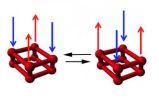(Press-News.org) Researchers from the University of Oxford, the University of Limerick, and the Harvard School of Public Health have developed a mathematical model to examine online social networks, in particular the trade-off between copying our friends and relying on 'best-seller' lists.
The researchers examined how users are influenced in the choice of apps that they install on their Facebook pages by creating a mathematical model to capture the dynamics at play. By incorporating data from the installation of Facebook apps into their mathematical model, they found that users selected apps on the basis of recent adoptions by their friends rather than by using Facebook's equivalent of a best-seller list of apps. The model suggests users tended to be swayed by recent activity—from their `friends' on Facebook—that they saw on their Facebook feeds over the previous couple of days. The research, published in the journal, Proceedings of the National Academy of Sciences, finds that the "copycat" tendency in human behaviour is strong and that we can be influenced by the activities of others over a relatively short period of time.
The mathematical model examined data from an empirical study published in 2010, which had tracked 100 million installations of apps adopted by Facebook users during two months. In the 2010 study, based on data collected in 2007, all Facebook users were able to see a list of the most popular apps (similar to best-seller lists) on their pages, as well as being notified about their friends' recent app installations. In the 2010 study (which included two of the authors of the new study), researchers found that in some cases, a user's decision to install some apps seemed virtually unaffected by the activities of others, whereas sometimes they were strongly affected by the behaviour of others – even though the apps in these two categories did not appear to be distinguished by any particular characteristics. Instead, once an app reached some popularity threshold (as measured by the installation rate), its popularity tended to rise to stellar proportions.
In the new study, the researchers developed a mathematical model to distinguish between the consequences of two distinct, competing mechanisms that appeared to drive the dynamics behind the behaviour of the Facebook users. Using their model and extensive computer simulations, they looked behind the empirical data to see whether Facebook users' behaviour could be modelled as being influenced primarily by the notifications of apps recently installed on their friends' Facebook pages or mainly driven by which apps appeared on the best-seller list. Using the supercomputers of the Irish Centre for High-End Computing (ICHEC), the researchers ran thousands of simulations in which they varied the relative dominance of the two influences (recent installations versus cumulative popularity). It took the researchers 15,000 hours of computer processing to best match the results of the simulations with the characteristics of app installation that were observed in the earlier empirical study.
The researchers found that, although users seem to be influenced by both, the stronger effect on popularity dynamics was caused by the recent behaviour of others. The best-seller list did have a 'mild' effect on the behaviour of Facebook users, but an instinct to copy the behaviour of others was by far the more dominant instinct.
Associate Professor Felix Reed-Tsochas, James Martin Lecturer in Complex Systems at the Said Business School and Director of Complexity Economics at the Institute for New Economic Thinking at the University of Oxford, said: 'We have used sophisticated modelling techniques to show how it is possible to tease apart different causal mechanisms that underpin behaviour even when the empirical data are purely observational. This is significant because the assumption these days is that only experimental research designs can provide such answers. Here, we found that the "copycat" tendency plays a very important role in online behaviour. This might be because users need to make quick decisions in information-rich environments, but other research has identified similar imitative behaviour in the off-line world.'
Professor James Gleeson, from the Department of Mathematics and Statistics at the University of Limerick, said: 'This study reveals how we can explore different scenarios using mathematical models to disentangle what drives people to behave the way they do using large data sets from the real online world. This opens up lots of new possibilities for studying human behaviour.'
Commenting on the significance of the method behind the study, Associate Professor Mason Porter, from the Mathematical Institute at University of Oxford, said: 'We hope that our paper can help serve as a guide for modelling complex systems and how data can be incorporated directly into such modelling efforts. The importance of mathematical modelling often seems to be lost amidst the overabundance of empirical studies, and I cannot stress enough that mathematics is also crucial to help illustrate how things work.'
INFORMATION:
The other authors of the new study were Dr Davide Cellai (University of Limerick) and Assistant Professor Jukka-Pekka Onnela (Harvard).
For more information, contact the University of Oxford News and Information Office on +44 (0)1865 280534 or email: news.office@admin.ox.ac.uk.
NOTES FOR EDITORS
The paper, 'A simple generative model of collective online behavior', by James P Gleeson. Davide Cellai, Jukka-Pekka Onnela, Mason A Porter and Felix Reed-Tsochas will be published by Proceedings of the National Academy of Sciences.
The paper is strictly embargoed until 3pm US Eastern Time/ or 8pm BST on Monday, 7 July 2014.
The data used by the research team contains no information about individuals, and only information about individual applications, so there are no implications in terms of the privacy of individual Facebook users.
Mathematical model illustrates our online 'copycat' behavior
Researchers have developed a mathematical model to examine online social networks, in particular the trade-off between copying our friends and relying on 'best-seller' lists
2014-07-07
ELSE PRESS RELEASES FROM THIS DATE:
Time of day crucial to accurately test for diseases, new research finds
2014-07-07
A new study published today in the journal PNAS (Proceedings of the National Academy of Sciences), has found that time of day and sleep deprivation have a significant effect on our metabolism. The finding could be crucial when looking at the best time of day to test for diseases such as cancer and heart disease, and for administering medicines effectively.
Researchers from the University of Surrey and The Institute of Cancer Research, London, investigated the links between sleep deprivation, body clock disruption and metabolism, and discovered a clear variation in metabolism ...
The quantum dance of oxygen
2014-07-07
Perhaps not everyone knows that oxygen has – quite unusually for such a simple molecule – magnetic properties. The phase diagram of solid oxygen at low temperatures and high pressures shows, however, several irregularities (for example, proper "information gaps" with regard to these magnetic properties) that are still poorly understood. A team of researchers from the International School for Advanced Studies (SISSA) and International Centre for Theoretical Physics Abdus Salam (ICTP) of Trieste, while trying to understand the origin of these phenomena, have identified a ...
DNA of 'Evolution Canyon' fruit flies reveals drivers of evolutionary change
2014-07-07
Scientists have long puzzled over the genetic differences between fruit flies that live hardly a puddle jump apart in a natural environment known as "Evolution Canyon" in Mount Carmel, Israel.
Now, an international team of researchers led by scientists with the Virginia Bioinformatics Institute at Virginia Tech has peered into the DNA of these closely related flies to discover how these animals have been able to adapt and survive in such close, but extremely different, ecologies.
One reason lies in a startling abundance of repetitive DNA elements that, until recently, ...
High earners in a stock market game have brain patterns that can predict market bubbles
2014-07-07
If you're so smart, why aren't you rich? It may be that, when it comes to stock market success, your brain is heeding the wrong neural signals.
In a study in the Proceedings of the National Academy of Sciences this week, scientists at the Virginia Tech Carilion Research Institute and Caltech found that, when they simulated market conditions for groups of investors, economic bubbles — in which the price of something could differ greatly from its actual value — invariably formed.
Even more remarkably, the researchers discovered a correlation between specific brain activity ...
Negar Sani solved the mystery of the printed diode
2014-07-07
VIDEO:
The video shows how a printed label picks up the radio signal from a telephone making a call, and uses the energy to switch the integrated display. This is only...
Click here for more information.
With an article published in the Proceedings of the National Academy of Sciences in the United States of America (PNAS), a thirteen-year-long mystery that has involved a long series of researchers at both Linköping University and Acreo Swedish ICT has finally been solved.
The ...
Neuroeconomists confirm Warren Buffett's wisdom
2014-07-07
Investment magnate Warren Buffett has famously suggested that investors should try to "be fearful when others are greedy and be greedy only when others are fearful."
That turns out to be excellent advice, according to the results of a new study by researchers at Caltech and Virginia Tech that looked at the brain activity and behavior of people trading in experimental markets where price bubbles formed. In such markets, where price far outpaces actual value, it appears that wise traders receive an early warning signal from their brains—a warning that makes them feel uncomfortable ...
Smart and socially adept
2014-07-07
Wanted: Highly skilled individual who is also a team player. In other words, someone who knows his or her stuff and also plays well with others.
Two qualities are particularly essential for success in the workplace: book smarts and social adeptness. The folks who do well tend to demonstrate one or the other. However, according to research conducted by UC Santa Barbara economist Catherine Weinberger, the individuals who reach the highest rungs on the corporate ladder are smart and social. Her findings appear in a recent online issue of the Review of Economics and Statistics.
Weinberger, ...
The tortoise and the hare: A sex difference in marathon pacing
2014-07-07
ALLENDALE, Mich. — Men are more likely than women to slow their pace in the marathon, according to a new study led by a Grand Valley State University researcher. The findings were published in Medicine & Science in Sports & Exercise.
The study, led by Robert Deaner, associate professor of psychology at Grand Valley State, was based on 14 marathons that occurred in the U.S. in 2011, and it included almost 92,000 performances. On average, men ran the second half of the marathon 15.6 percent slower than the first half, whereas women slowed by an average of 11.7 percent. ...
Slim down for the health of it and possibly reduce your hot flashes in the process
2014-07-07
CLEVELAND, Ohio (July 7, 2014)—Now women have yet one more incentive to lose weight as a new study has shown evidence that behavioral weight loss can help manage menopausal hot flashes.
The pilot study, which was published online last month in Menopause, the journal of The North American Menopause Society (NAMS), consisted of 40 overweight or obese white and African-American women with hot flashes, which are the most prevalent symptom of menopause. In fact, more than 70% of women report hot flashes during the menopausal transition, with many of these women reporting frequent ...
US scientists don't publish articles about potential role of innate variation in athletic performance
2014-07-07
ALLENDALE, Mich. — Compared to scientists working in other countries, U.S.-based scientists are underrepresented as authors of articles on the potential role of innate variation in athletic performance that are published in peer-reviewed science journals, according to Grand Valley State University researchers.
The findings are published in the online journal SpringerPlus.
The research, conducted by Michael P. Lombardo, professor of biology, and Shadie Emiah, a Grand Valley State graduate student, used information about the authors of 290 articles published in peer-reviewed ...
LAST 30 PRESS RELEASES:
Fossil amber reveals the secret lives of Cretaceous ants
Predicting extreme rainfall through novel spatial modeling
The Lancet: First-ever in-utero stem cell therapy for fetal spina bifida repair is safe, study finds
Nanoplastics can interact with Salmonella to affect food safety, study shows
Eric Moore, M.D., elected to Mayo Clinic Board of Trustees
NYU named “research powerhouse” in new analysis
New polymer materials may offer breakthrough solution for hard-to-remove PFAS in water
Biochar can either curb or boost greenhouse gas emissions depending on soil conditions, new study finds
Nanobiochar emerges as a next generation solution for cleaner water, healthier soils, and resilient ecosystems
Study finds more parents saying ‘No’ to vitamin K, putting babies’ brains at risk
Scientists develop new gut health measure that tracks disease
Rice gene discovery could cut fertiliser use while protecting yields
Jumping ‘DNA parasites’ linked to early stages of tumour formation
Ultra-sensitive CAR T cells provide potential strategy to treat solid tumors
Early Neanderthal-Human interbreeding was strongly sex biased
North American bird declines are widespread and accelerating in agricultural hotspots
Researchers recommend strategies for improved genetic privacy legislation
How birds achieve sweet success
More sensitive cell therapy may be a HIT against solid cancers
Scientists map how aging reshapes cells across the entire mammalian body
Hotspots of accelerated bird decline linked to agricultural activity
How ancient attraction shaped the human genome
NJIT faculty named Senior Members of the National Academy of Inventors
App aids substance use recovery in vulnerable populations
College students nationwide received lifesaving education on sudden cardiac death
Oak Ridge National Laboratory launches the Next-Generation Data Centers Institute
Improved short-term sea level change predictions with better AI training
UAlbany researchers develop new laser technique to test mRNA-based therapeutics
New water-treatment system removes nitrogen, phosphorus from farm tile drainage
Major Canadian study finds strong link between cannabis, anxiety and depression
[Press-News.org] Mathematical model illustrates our online 'copycat' behaviorResearchers have developed a mathematical model to examine online social networks, in particular the trade-off between copying our friends and relying on 'best-seller' lists




